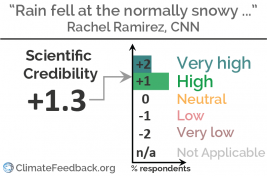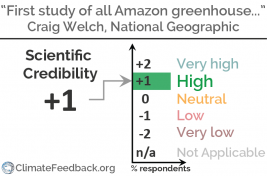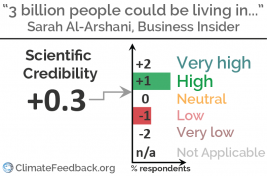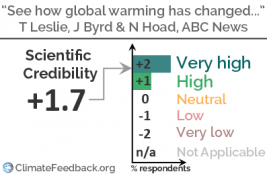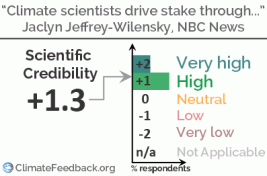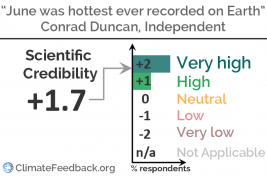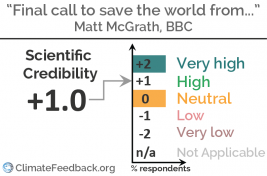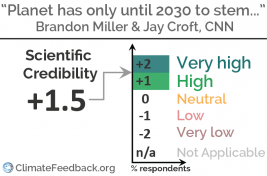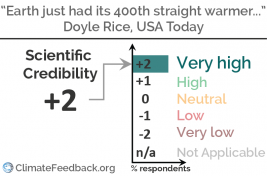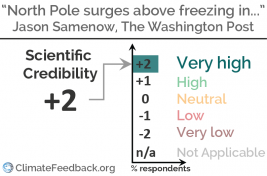.
Articles tagged as: Accurate definition
Rain fell on Greenland summit for the first time on record, as accurately reported by CNN
in CNN, by Rachel Ramirez
“The article is highly factual. One issue that we have is the lack of data over the Greenland Ice Sheet (both spatially and temporally). Thus some of the claims, although backed by the limited data, are valid; we can’t be sure that we may have missed similar outliers. For example, we can’t be sure that a rain event of the type described did not occur in the period before observations were made or may have occurred somewhere on the ice sheet before in a region without any observations.”
— 29 Sep 2021
Destruction of the Amazon forest very likely contributes to global warming, as accurately described in The National Geographic article
in National Geographic, by Craig Welch
“The article is good overall, although there are two small issues. First, the title seems to overestimate the results. The scientific study the National Geographic article is based on cannot account for all of the climate forcers, as there are no Amazon basin wide estimates (as clearly stated in the study). This drawback could potentially change the overall warming effect, and therefore the title seems to exaggerate.”
— 23 Mar 2021
Article in Business Insider accurately describes results from a study estimating up to 3 billion people could live in much warmer temperatures by 2070
in Business Insider, by Sarah Al-Arshani
The article in Business Insider discusses findings from a study published May, 2020 that projected one to three billion people could live in much warmer climates by 2070, assuming migration is limited and greenhouse gas emissions remain high. The Business Insider article accurately describes the study’s projected changes in mean annual temperatures around the globe, however, the study does not describe these increased temperatures as “unbearable” or “unlivable,” as claimed in the article.
— 12 May 2020
ABC article effectively illustrates important climate trends for Australian readers
in Australian Broadcasting Company, by Tim Leslie, Joshua Byrd, Nathan Hoad
“This article is exceptionally good in delivering accurate information in an engaging way. There are many useful statements made about the effects of climate change on extreme weather globally and in Australia and these have been backed up by links to relevant peer-reviewed literature.”
— 11 Dec 2019
NBC News story accurately covers research on two millennia of climate history
in NBC News, by Jaclyn Jeffrey-Wilensky
“This accurately describes new peer-reviewed research and asks independent scientists with relevant expertise to provide important context, such as how these results rely on limited southern hemisphere data. Simplifications help readers understand important points without misleading them.”
— 30 Jul 2019
Popular article in The Independent accurately summarizes June heat in Europe
in The Independent, by Conrad Duncan
“The article accurately and clearly states the facts regarding the recent extreme heat in June 2019 and its link to anthropogenic warming. This includes acknowledging that, at this point, this June record and its connection to climate change is based on only a single temperature product and one attribution study, and that further analysis may slightly change the initial conclusions drawn by researchers.”
— 05 Jul 2019
BBC article on IPCC report is mostly accurate, but could use some clarification
in BBC, by Matt McGrath
“Scientifically, the article is overall correct, but it is in cases inaccurate in its description of certain aspects of the IPCC. For example, the IPCC does not conduct research, but assesses the available scientific evidence. The article also provides statements without context, despite this being essential for their interpretation.”
— 21 Jan 2019
CNN accurately covers latest IPCC report
in CNN, by Brandon Miller
This CNN story covered the October release of the IPCC’s “Global Warming of 1.5 °C” report. The report, which was requested by governments during the 2015 Paris Agreement negotiations, details the impacts of 1.5 °C compared to 2 °C and the emissions cuts required to limit warming to either of those levels. Scientists who reviewed the story found that it conveyed the information in the report without any errors, and included comments by scientists to summarize the report’s implications.
— 19 Jan 2019
USA Today story updates readers on trend in monthly global temperatures
in USA Today, by Doyle Rice
“The piece accurately reports the surface temperature record warming of recent decades and joins the dots appropriately to the underlying cause of human emissions. It appropriately draws the distinction between regional/national records and the global mean behaviour. The included quotes are to authoritative sources.”
— 14 Jan 2019
Washington Post article accurately discusses warm Arctic weather event
in The Washington Post, by Jason Samenow
“This article accurately describes the Arctic warming event and associated surprise by scientists, includes multiple explanations for possible causes, and does not overstate any connections to climate change, pointing out that more data is needed to know if these above-freezing events will be a new Arctic normal.”
— 14 Jan 2019

